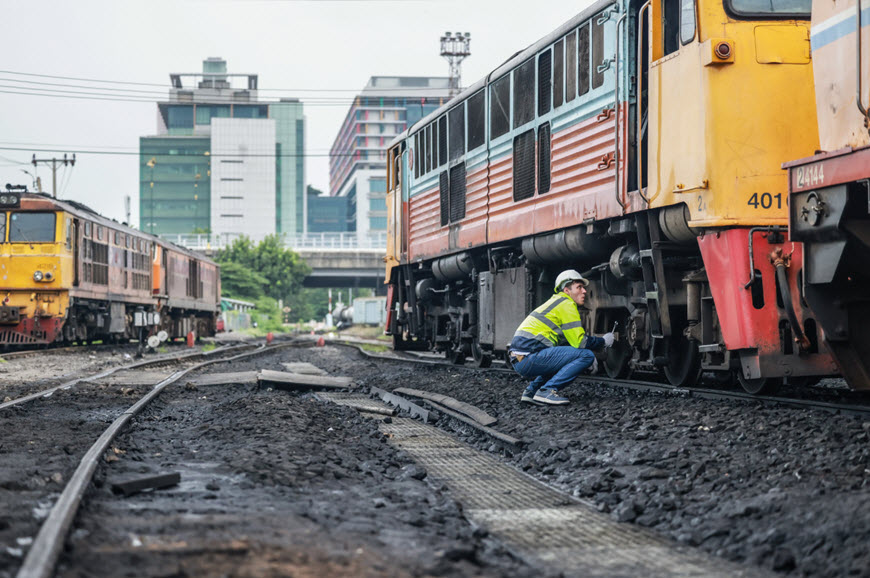Railroad Workers and Cancer Injuries
July 17, 2025 | Personal injury
Attention Railroad Workers: Know the Risks of Asbestos and Toxic Exposures – You May Be Entitled to Justice
As a seasoned attorney with many years of experience in personal injury and mass tort litigation, I understand the profound impact that occupational exposures can have on your health and well-being. At High & Younes, LLC., I have built a reputation for fighting for the rights of individuals harmed by corporate negligence, and today, I want to address a crucial issue that may affect many current and former railroad workers: the link between your work environment and serious, sometimes life-threatening cancers.
The Hidden Dangers of Railroad Work
Railroad workers have historically been exposed to a multitude of hazardous substances, often without full awareness of the risks. From asbestos insulation in locomotives and railcars to diesel exhaust fumes and creosote-treated wood, these exposures can significantly increase your risk of developing certain types of cancer. Unfortunately, many workers only discover their illnesses are linked to their occupational exposures after a diagnosis, leaving them feeling overwhelmed and uncertain about their legal options.
Cancers That May Be Related to Railroad Work
If you’ve been diagnosed within the past three years with any of the following cancers, it’s vital to understand that your occupational history may be a significant contributing factor:
- Mesothelioma
- Lung Cancer
- Throat Cancers (Esophageal, Laryngeal, Pharyngeal)
- Colon Cancer
- Rectal Cancer
Research has increasingly shown that these cancers can be associated with various exposures common in railroad environments, including asbestos, diesel exhaust, creosote, silica, and even radiation.
How Does Exposure Lead to Cancer?
Asbestos: Once widely used in locomotive insulation, brake pads, gaskets, and other parts, asbestos fibers can become airborne and inhaled. These fibers embed in lung tissue and other organs, causing inflammation, scarring, and genetic mutations that may eventually lead to cancer. Mesothelioma, a rare and aggressive cancer, is almost exclusively linked to asbestos exposure.
Diesel Exhaust: Diesel fumes contain polycyclic aromatic hydrocarbons (PAHs), which are known carcinogens. Railroad workers, especially those involved in locomotive maintenance, fueling, and yard work, are frequently exposed to diesel exhaust. Long-term inhalation increases the risk of lung cancer and possibly other cancers such as throat, colon, and rectal.
Creosote and Other Toxins: Railroad ties are often treated with creosote, a complex mixture of chemicals that contain carcinogenic compounds. Workers involved in tie maintenance, replacement, or handling may be exposed to creosote vapors, increasing their risk for various cancers.
Silica and Radiation: Exposure to silica dust during railroad construction or maintenance can lead to lung disease and cancer. Additionally, certain railroad occupations may involve radiation exposure, which has been linked to various cancers.
Why Are These Cancers Particularly Relevant to Railroad Workers?
Many railroad workers may not immediately associate their work environment with their health diagnoses. The latency period for many occupational cancers can be decades, meaning symptoms may only appear long after exposures have occurred. Moreover, the combination of asbestos, diesel exhaust, creosote, and other toxins can have synergistic effects, further elevating cancer risk.
Studies and legal precedents have established that these exposures are not only hazardous but also legally compensable when linked to occupational activities. If you have been diagnosed with any of these cancers within the last three years, it’s crucial to act now.
Your Legal Rights and Options
At High & Younes, LLC., we have a proven track record of representing individuals affected by occupational hazards, including those in the railroad industry. Our firm specializes in mass torts and complex personal injury cases, and we’ve successfully prosecuted claims related to asbestos exposure, toxic torts, and environmental hazards.
If you or a loved one has been diagnosed with mesothelioma, lung, throat, colon, or rectal cancer, contact us today. We can help determine whether your cancer is connected to your work history and guide you through the process of pursuing compensation.
Why Choose High & Younes, LLC.?
- Experience and Expertise: Our firm has decades of experience in personal injury, wrongful death, and mass tort litigation. We understand the complexities of these cases and know how to navigate the legal system effectively.
- Nationwide Representation: We represent individuals across the country, ensuring that you have access to top-tier legal support regardless of your location.
- Dedicated Support: We handle all aspects of your case — from investigation to litigation — so you can focus on your health and family.
- No Upfront Costs: We work on a contingency basis, meaning you don’t pay any fees unless we win your case.
Take Action Today
If you’re a railroad worker diagnosed with mesothelioma, lung, throat, colon, or rectal cancer in the past three years, don’t wait. The statute of limitations may limit your ability to seek compensation, so it’s vital to consult an experienced attorney promptly.
Contact Frank Younes at High & Younes, LLC. for a free consultation. We will review your case, assess your exposure history, and advise you on the best course of action. Remember, you’ve worked hard to build a career in the railroad industry — now let us help you pursue the justice and compensation you deserve.
Your health and legal rights matter. Reach out today — we’re here to help.

Railroad Workers and Cancer Injuries

